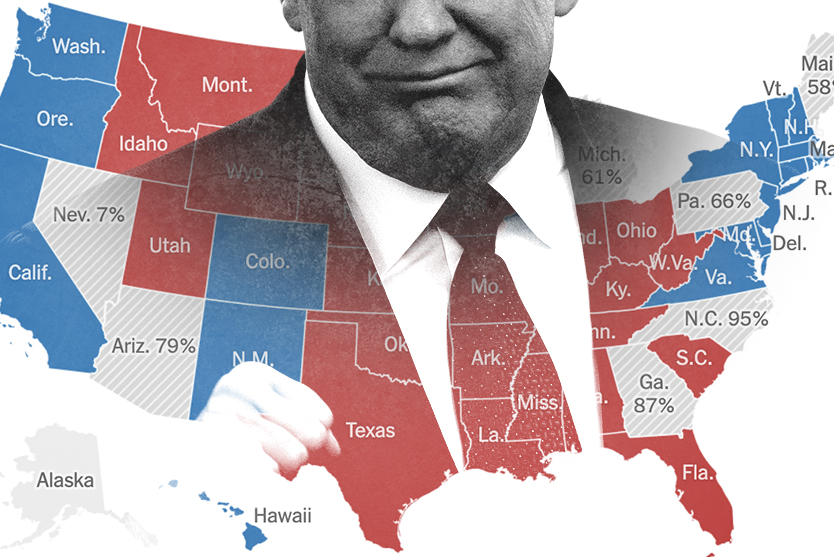What we know: Trump's only shot is another Electoral College special


A free daily email with the biggest news stories of the day – and the best features from TheWeek.com
You are now subscribed
Your newsletter sign-up was successful
Early Wednesday morning, in the contest between Joe Biden and Donald Trump, it was unclear who would win the Electoral College and thus the presidency. However, at time of writing Joe Biden had a decisive lead in the popular vote — just like Hillary Clinton did in 2016. This lead is almost certain to expand markedly as late-arriving ballots, particularly in California where Biden has a huge margin of victory, are collected and tabulated.
No other democratic nation has anything like the Electoral College. In general, they either have a parliamentary system, in which the party that wins the most seats gets to run the government, or a national popular vote for president. The same is true for gubernatorial elections in all the American states, except Mississippi (though even that may be ended soon).
None of the common justifications for the Electoral College hold up in the slightest. Aside from theoretically allowing a candidate to win the presidency while losing the popular vote 4-1, in practice it neither empowers small states nor disempowers large ones. On the contrary, as has been proved time and again, most of the smallest and largest states are ignored by political campaigns, because they are not competitive. The Electoral College only empowers a handful of states that randomly happen to have a close partisan balance. Moreover, if a certain set of states came firmly under the control of one party — if Texas became solidly Democratic, for instance — it would be impossible for them to lose the presidency.
The Week
Escape your echo chamber. Get the facts behind the news, plus analysis from multiple perspectives.

Sign up for The Week's Free Newsletters
From our morning news briefing to a weekly Good News Newsletter, get the best of The Week delivered directly to your inbox.
From our morning news briefing to a weekly Good News Newsletter, get the best of The Week delivered directly to your inbox.
It's been an anxious night for anyone concerned about who will be the next president of the United States. But if the candidate with the most votes became president, then this election would already be over.
A free daily email with the biggest news stories of the day – and the best features from TheWeek.com
Ryan Cooper is a national correspondent at TheWeek.com. His work has appeared in the Washington Monthly, The New Republic, and the Washington Post.
-
 Is Andrew’s arrest the end for the monarchy?
Is Andrew’s arrest the end for the monarchy?Today's Big Question The King has distanced the Royal Family from his disgraced brother but a ‘fit of revolutionary disgust’ could still wipe them out
-
 Quiz of The Week: 14 – 20 February
Quiz of The Week: 14 – 20 FebruaryQuiz Have you been paying attention to The Week’s news?
-
 The Week Unwrapped: Do the Freemasons have too much sway in the police force?
The Week Unwrapped: Do the Freemasons have too much sway in the police force?Podcast Plus, what does the growing popularity of prediction markets mean for the future? And why are UK film and TV workers struggling?
-
 Epstein files topple law CEO, roil UK government
Epstein files topple law CEO, roil UK governmentSpeed Read Peter Mandelson, Britain’s former ambassador to the US, is caught up in the scandal
-
 Iran and US prepare to meet after skirmishes
Iran and US prepare to meet after skirmishesSpeed Read The incident comes amid heightened tensions in the Middle East
-
 Israel retrieves final hostage’s body from Gaza
Israel retrieves final hostage’s body from GazaSpeed Read The 24-year-old police officer was killed during the initial Hamas attack
-
 China’s Xi targets top general in growing purge
China’s Xi targets top general in growing purgeSpeed Read Zhang Youxia is being investigated over ‘grave violations’ of the law
-
 Panama and Canada are negotiating over a crucial copper mine
Panama and Canada are negotiating over a crucial copper mineIn the Spotlight Panama is set to make a final decision on the mine this summer
-
 Why Greenland’s natural resources are nearly impossible to mine
Why Greenland’s natural resources are nearly impossible to mineThe Explainer The country’s natural landscape makes the task extremely difficult
-
 Iran cuts internet as protests escalate
Iran cuts internet as protests escalateSpeed Reada Government buildings across the country have been set on fire
-
 US nabs ‘shadow’ tanker claimed by Russia
US nabs ‘shadow’ tanker claimed by RussiaSpeed Read The ship was one of two vessels seized by the US military
